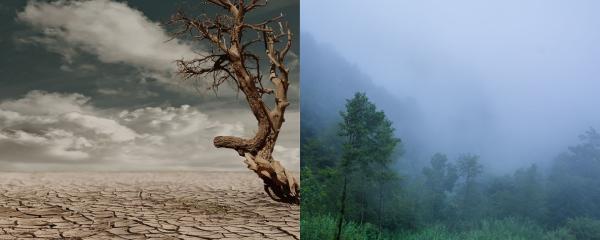
IIT Palakkad study shows how different indices used to predict drought combined with effects fof climate change can lead to different climate predictions for the future

IIT Palakkad study shows how different indices used to predict drought combined with effects fof climate change can lead to different climate predictions for the future
Researchers from Biodiversity International and collaborators from Norway, Nicaragua, Italy, Ethiopia, Costa Rica, Honduras, Germany, and India have described how participation of farmers as citizen scientists can help to address this challenge.
Recent discoveries such as a new species of burrowing eel, a new sub-subspecies of endangered hog deer and several species of frogs,
Report suggests that the Hindu Kush Himalayan region is facing imminent threat due to climate change.
In a new study, Shreekant Deodhar and Kavita Isvaran from the Indian Institute of Science, Bengaluru, have tried to decode the meaning of the various behavioural signals exhibited by these drop-dead gorgeous male lizards.
Researchers from IIT Kanpur, Pacific Northwest National Laboratory, USA, University of Hyderabad, and IIT Delhi have tried to understand how aerosols affect the Indian monsoon season.
Study from IIT Kharagpur provides more evidence of the recovering Antarctic ozone hole
Researchers at the Institute of Seismological Research, Gandhinagar M. S. University of Baroda, MG Science Institute, Ahmedabad and ETH Zurich, Switzerland, have found evidence of a fourth tsunami event on the coast of Kachchh in western India, which happened about a thousand year ago and was previously undocumented.
Imagine you come home to your city and find no one! While it isn’t very probable in human societies, a similar phenomenon called colony collapse disorder is often found in honeybees. Here, worker bees mysteriously start disappearing from their hives, and that leaves no one to do the housekeeping, nursing and foraging. Hence, the honey bee colonies start collapsing.
Researchers from IIT Kharagpur and the Borehole Geophysics Research Laboratory, Karad, have found evidence of microbial life in the rock samples of the Koyna-Warna region of western India.
Researchers from the Wildlife Institute of India, Dehradun, have discovered a new subspecies of hog deer (Axis porcinus) in Northeast India, which was earlier thought to have been found only in southeast Asia.